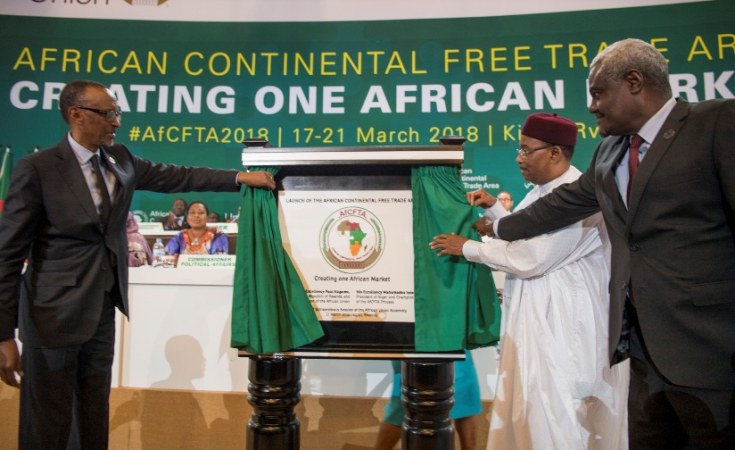Rwanda's Paul Kagame is concluding the most consequential presidency of the African Union since the formative years of the institution. The organization's Extraordinary Summit in November adopted most of his ambitious reform agenda, approving changes that will shape the AU's organizational structure, budget and relationship with member states for years to come.
Kagame launched these initiatives as chairman of the AU Reform Team, beginning in 2016 and then skillfully lobbying his fellow heads of state for approval during his 2018 presidency. It is testament to his leadership and persuasion that he quickly garnered support for the reforms in an organization that has been cautious to embrace change.
This is only the latest example of his astute placement of Rwanda at the center of multilateral institutions. The approach has given Rwanda a prominent voice in shaping the continental agenda as well as a platform on which to advance its national interests.
Kagame's strategy has worked not only because he has aggressively pursued important multilateral posts, but also because he has named top-quality, hard-working candidates who have delivered significant results – just as he did during the past year at the AU.
Only last month, Rwanda drew on solid support from French-speaking members of the African Union to orchestrate the election of foreign minister Louise Mushikiwabo as secretary general of the International Francophonie Organization (OIF). For the next five years – or perhaps 10 if she is re-elected – she will head a worldwide network representing 54 member states, plus observers and associates, with a population of nearly 300 million. She exemplifies the Rwandan strategy, honed over the past 15 years, of using leadership in multilateral organizations to gain entrée to global decision-makers, promote Rwanda's national development agenda and disarm its foreign critics.
Kagame's pursuit of multilateral posts began in the early 2000s when Rwanda needed to refresh its brand. Its reputation had suffered from its brutal intervention in the DR Congo, just as Western guilt for inaction during the 1994 genocide began to fade. Kagame secured election of his trusted advisor Patrick Mazimpaka as deputy chairperson of the newly created African Union. From this vantage point, Mazimpaka provided Kagame not only visibility on all AU diplomatic and security initiatives from 2003 to 2008, but also a means of deflecting any moves against Kigali.
In 2005, Rwanda greatly increased its profile on regional economic issues when Donald Kaberuka was elected president of the African Development Bank. During his decade-long tenure at the AfDB, Kaberuka became a respected advocate for the continent in international fora. He ensured that a Rwandan perspective was at the center of key finance and development debates shaping the future of African economies.
Rwanda further boosted its multilateral presence beginning in 2004 by taking on tough assignments in international peacekeeping, first in Darfur. Today, Rwanda is the world's second-largest contributor of UN peacekeepers after Ethiopia. Top Rwandan military leaders have held a string of senior command positions in AU and United Nations peacekeeping missions since 2007. The experienced Lieutenant General Frank Kamanzi currently serves as Force Commander for the UN Mission in South Sudan, a major security priority for the continent.
Election to the UN Security Council in 2013-2014 further added to Rwanda's influence. The council seat gave Kigali a say in the UN response to all global security matters during this period. They included many issues affecting Rwanda's direct interests in the Great Lakes region – among them, the 2013 end-game for the M-23 rebel group in the DR Congo.
In 2009, Rwanda joined the East African Community as well as the Commonwealth, anchoring its economic future in east Africa and embracing the English-speaking world. Less than two years later, the capable former Rwandan diplomat and health minister Richard Sezibera became EAC executive secretary, serving from 2011 to 2016. He pursued an ambitious agenda of regional integration and closer EAC ties with the East and Southern African regional groupings, COMESA and SADC, which also helped Rwanda benefit from these larger markets.
Despite being a tiny, land-locked country of only 13 million people, Rwanda has secured investment for regionally-focused projects such as a new airport capable of handling 4.5 million passengers a year and Dubai Ports World's new inland container terminal, scheduled to open early in 2019.
This 15-year stretch of Rwandan influence in multilateral organizations has paid such dividends that Kagame appears determined to continue his efforts. Even as he concludes his tenure as AU president, Louise Mushikiwabo is taking over at the Francophonie – and Kigali is already gearing up to host some 40 world leaders for the 2020 Commonwealth Heads of Government meeting. We can expect Kagame to continue to leverage multilateral leadership as a means for Rwanda to play an outsized role in the African and global arena.
James C. Swan is a retired American diplomat who has served as Special Representative for Somalia, ambassador to Djibouti and the Democratic Republic of the Congo and as Deputy Assistant Secretary of State for African Affairs in Washington, DC. He is now senior adviser in the Africa practice of the Washington-based Albright Stonebridge Group.


